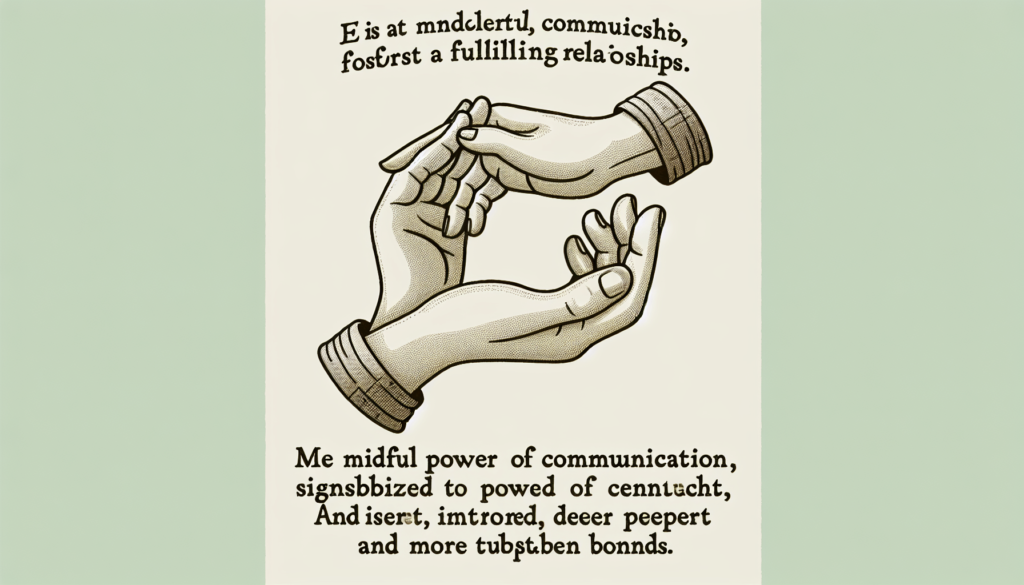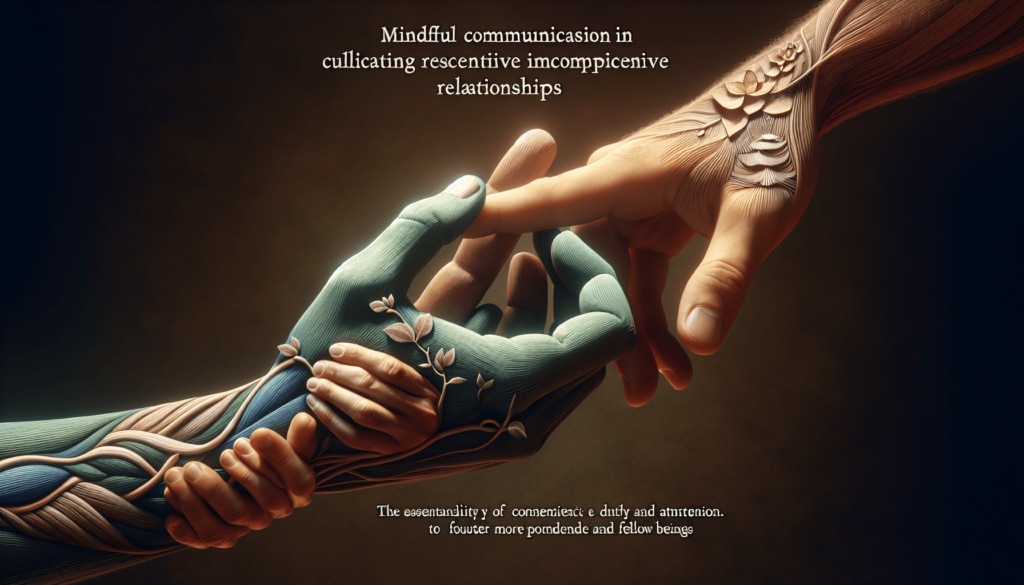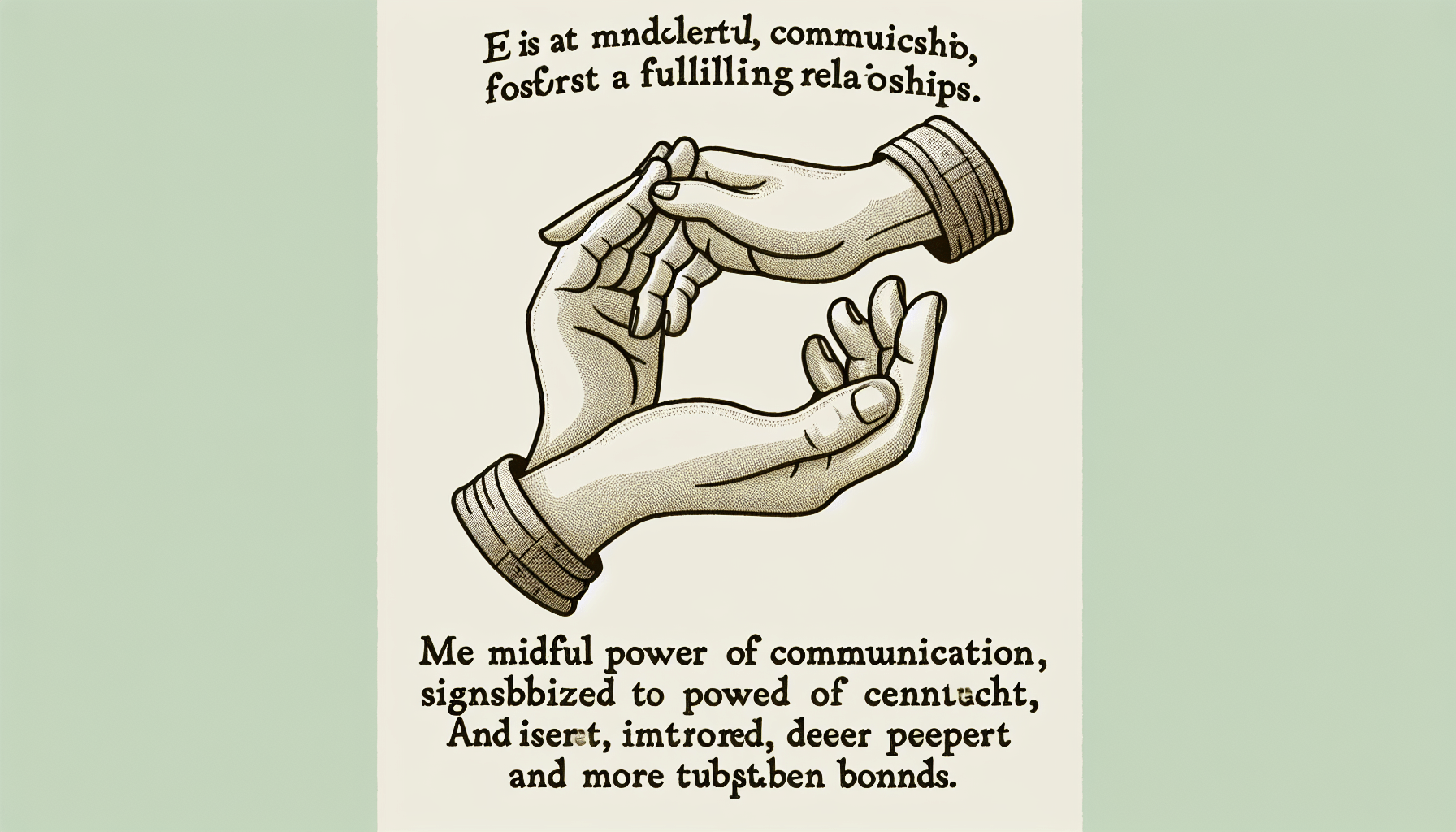Welcome to an insightful article on the importance of nurturing holistic relationships through mindful communication. In this piece, you will discover the power of being present in your interactions, actively listening to others, and using empathy to truly connect with those around you. By incorporating these practices into your daily interactions, you will not only strengthen your relationships but also create a more harmonious and fulfilling life. So let’s embark on this journey towards deeper connections and greater understanding together. Hey there! Have you ever found yourself struggling with communication in your relationships? We’ve all been there at one point or another. The key to fostering healthy and holistic relationships lies in practicing mindful communication. Let’s delve into the ins and outs of this essential skill and how you can nurture your connections through it.
What is Mindful Communication?
Mindful communication is all about being present and fully engaged in your interactions with others. It involves listening attentively, speaking with intention, and being aware of the impact your words have on those around you. By practicing mindful communication, you can cultivate deeper connections, resolve conflicts more effectively, and strengthen your relationships.
How can Mindful Communication benefit your Relationships?
When you practice mindful communication, you are able to truly understand and connect with the people in your life. By listening actively and without judgment, you show others that you value their thoughts and feelings. This can lead to increased trust, empathy, and mutual respect in your relationships.
The Components of Mindful Communication
Mindful communication is made up of several key components that work together to create meaningful and authentic connections with others. Let’s break down these components and explore how you can incorporate them into your daily interactions.
1. Presence
Being present is essential in mindful communication. When you are fully engaged in the conversation and focused on the person you are speaking with, you are better able to understand their perspective and respond thoughtfully. Practice being in the moment and giving your full attention to the other person.
2. Active Listening
Active listening involves more than just hearing the words that are being spoken. It requires you to pay attention to the speaker’s body language, tone of voice, and emotions. By listening actively, you can gain a deeper understanding of the message being conveyed and respond in a way that shows you truly understand.
3. Empathy
Empathy is the ability to understand and share the feelings of another person. When you practice empathy in your communication, you are able to validate the other person’s emotions and show that you care about their well-being. By expressing empathy, you can create a supportive and nurturing environment for open and honest dialogue.
4. Authenticity
Authenticity is about being genuine and true to yourself in your interactions with others. When you speak from the heart and share your thoughts and feelings honestly, you foster trust and connection in your relationships. By being authentic, you invite others to do the same and create a space for vulnerability and growth.

Tips for Practicing Mindful Communication
Now that you have a better understanding of the components of mindful communication, let’s explore some practical tips for incorporating this skill into your daily interactions.
1. Set Intentions
Before engaging in a conversation, take a moment to set your intentions. Ask yourself what you hope to achieve from the interaction and how you can best support the other person. By setting intentions, you can approach the conversation with purpose and mindfulness.
2. Practice Mindful Breathing
Mindful breathing can help you center yourself and stay focused during conversations. Take a few deep breaths before speaking or responding, and allow yourself to calm your mind and body. This can help you regulate your emotions and respond more mindfully to the other person.
3. Reflect on Your Communication Style
Take time to reflect on your communication style and identify any patterns or habits that may be hindering your ability to connect with others. Are you an active listener? Do you express empathy towards others? By gaining awareness of your communication tendencies, you can make positive changes and improve your relationships.
4. Practice Non-Judgment
Mindful communication involves approaching conversations with an open mind and without judgment. Try to suspend your assumptions and preconceived notions about the other person, and instead, focus on listening and understanding their perspective. By practicing non-judgment, you can create a safe space for honest and authentic dialogue.
Applying Mindful Communication in Different Relationships
Mindful communication can be applied in various types of relationships, whether it’s with your partner, family members, friends, or colleagues. Let’s explore how you can practice mindful communication in different contexts to nurture holistic relationships.
With Your Partner
In your romantic relationship, mindful communication can help you deepen your connection, resolve conflicts, and strengthen your bond. Practice active listening, express empathy, and be authentic in your interactions with your partner. By prioritizing mindful communication, you can create a loving and supportive partnership built on trust and understanding.
With Family Members
Communication within a family setting can sometimes be challenging due to differing personalities and dynamics. By practicing mindful communication with your family members, you can foster closer relationships, resolve conflicts peacefully, and create a harmonious environment at home. Listen with empathy, speak authentically, and show love and understanding towards your family members.
With Friends
Mindful communication is key to maintaining healthy and supportive friendships. When interacting with your friends, make an effort to listen attentively, offer empathy and support, and be genuine in your responses. By practicing mindful communication, you can strengthen your friendships, build trust, and create lasting bonds based on mutual respect and care.
With Colleagues
Effective communication is essential in the workplace for collaboration, problem-solving, and team cohesion. By incorporating mindful communication into your interactions with colleagues, you can enhance productivity, reduce misunderstandings, and foster a positive work environment. Practice active listening, express empathy, and communicate authentically to build strong and productive working relationships.

Overcoming Challenges in Mindful Communication
While mindful communication can greatly benefit your relationships, it’s important to acknowledge that challenges may arise along the way. Let’s explore some common obstacles to mindful communication and how you can overcome them to nurture holistic relationships.
Reactivity
Reactivity is a common barrier to mindful communication, as it often leads to emotional responses and communication breakdowns. When faced with a triggering situation, try to pause, take a deep breath, and respond mindfully rather than reacting impulsively. By cultivating self-awareness and emotional regulation, you can avoid falling into reactive patterns and engage in more productive and constructive dialogue.
Distractions
In today’s fast-paced world, distractions are everywhere and can interfere with our ability to communicate mindfully. To overcome distractions, try to create a space free from interruptions when engaging in important conversations. Turn off your phone, minimize background noise, and focus on giving your full attention to the other person. By reducing distractions, you can deepen your connections and engage more meaningfully in your interactions.
Lack of Empathy
Empathy is a cornerstone of mindful communication, yet it can sometimes be challenging to express genuine empathy towards others. If you struggle with empathizing with someone, try to put yourself in their shoes and see the situation from their perspective. Listen attentively, validate their emotions, and show that you care about their well-being. By practicing empathy, you can create a compassionate and understanding space for communication to thrive.
Cultivating Mindful Communication as a Daily Practice
Mindful communication is a skill that can be cultivated and strengthened through consistent practice and self-awareness. By making mindful communication a daily practice, you can nurture holistic relationships, foster understanding, and create a harmonious environment in your personal and professional life. Here are some strategies for incorporating mindful communication into your daily routine.
Practice Mindful Listening
Set aside dedicated time each day to practice mindful listening. Choose a conversation with a loved one, friend, or colleague, and focus on listening attentively without interrupting or jumping to conclusions. Pay attention to the speaker’s words, emotions, and body language, and respond thoughtfully and empathetically. By practicing mindful listening regularly, you can enhance your communication skills and deepen your connections with others.
Journaling
Journaling can be a powerful tool for reflecting on your communication patterns, emotions, and experiences. Take time each day to write about your interactions, thoughts, and feelings, and explore how you can improve your communication style. Use journaling as a way to gain self-awareness, process your emotions, and set intentions for more mindful communication in the future.
Mindful Breathing Exercises
Mindful breathing exercises can help you stay present and grounded during challenging conversations or situations. Incorporate mindful breathing into your daily routine by taking a few minutes to focus on your breath and center yourself. Breathe deeply, exhale slowly, and allow yourself to relax and calm your mind. By practicing mindful breathing regularly, you can enhance your emotional regulation, reduce stress, and approach communication with a clear and focused mindset.
Self-Reflection
Self-reflection is a key component of mindful communication, as it allows you to gain insight into your thoughts, emotions, and behaviors. Take time each day to reflect on your interactions, communication style, and the impact your words have on others. Ask yourself what went well in your conversations, what you could improve on, and how you can be more mindful in your communication moving forward. By cultivating self-awareness through self-reflection, you can enhance your communication skills and strengthen your relationships.
Conclusion
Mindful communication is a transformative skill that can enrich your relationships, deepen your connections, and foster understanding and empathy in your interactions. By incorporating the principles of mindful communication into your daily life, you can create a positive and nurturing environment for communication to thrive. Remember to be present, listen actively, express empathy, and communicate authentically in your interactions with others. Practice mindful communication as a daily habit, and watch as your relationships flourish and grow in a holistic and meaningful way. Thank you for joining me on this journey to nurturing holistic relationships through mindful communication. Happy communicating!

